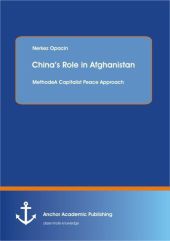 Neuerscheinungen 2014Stand: 2020-02-01 |
Schnellsuche
ISBN/Stichwort/Autor
|
Herderstraße 10
10625 Berlin
Tel.: 030 315 714 16
Fax 030 315 714 14
info@buchspektrum.de |

Nerkez Opacin
China´s Role in Afghanistan: A Capitalist Peace Approach
Erstauflage. 2014. 72 S. 8 Abb. 220 mm
Verlag/Jahr: ANCHOR ACADEMIC PUBLISHING 2014
ISBN: 3-9548928-4-7 (3954892847)
Neue ISBN: 978-3-9548928-4-6 (9783954892846)
Preis und Lieferzeit: Bitte klicken
The time has come to finally solve the quagmire in Afghanistan. Many recent concerns have been raised regarding the situation. For example, one of the main concerns is whether there could be another way that could lead to Afghanistan s security. This study attempts to address Chinese role in contributing to Afghanistan s stability through economic means. China in many ways should start to be seen as a potential factor that could lead to the stabilization of its own bordering region. Nowadays, many countries are rather afraid of Chinese policies and tend be rather cautious towards it. The solution for that would be that countries rather than being afraid of Chinese policy should take a more opportunistic approach, where China is seen as a country to benefit others.
Chinese reluctance to be militarily involved in Afghanistan has presented huge criticisms towards its policy, mainly from the U.S. point of view. China is even being considered as a free rider in Afghanistan. Meaning that at the expense of others that try to contribute to a more secure Afghanistan, China is getting its economic benefits out of this country without taking too much care to its security. For the time being, it seems like a controversy where China wants to invest heavily into Afghanistan, but does not want to contribute to any military interventions for its security sake. The question that lies ahead is whether China has any interests in a secure Afghanistan and how far China is willing to contribute to the process of stabilizing Afghanistan. Could the economical collaboration become an important aspect that contributes to more security in Afghanistan? Could the capitalist peace theory give some deeper understanding in this respect? Answering these questions is not something that can be done easily. One of the reasons is that in the field of studies about this particular issue, not much has been researched about. Both countries do express some interests in mutual cooperation, however, to clearly come to a conclusion of whether China is or could be an important factor that would lead to Afghanistan s development and stability requires further research. Nevertheless, enough information exists to shed some light on the issue through the presentation of the case study as well as to provide a starting point for broader analyses.
After receiving his B.A. in International Relations from the International University of Sarajevo in 2009, and his Master s degree in Peace and Security Studies (M.P.S.) from the Institute for Peace Research and Security Policy at the University of Hamburg in 2011 as a DAAD (German Academic Exchange Service) scholar, Nerkez Opacin now works as a Senior Assistant/Lecturer at the department of International Relations at the International University of Sarajevo. He is fluent in 5 languages and mainly focuses on research related to peace and security studies.


